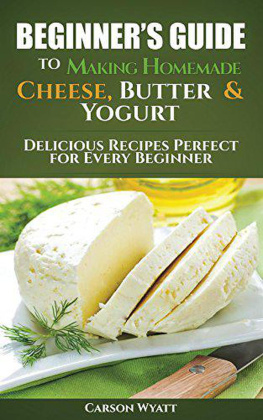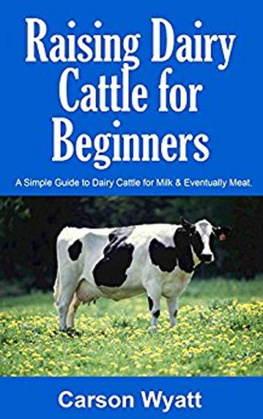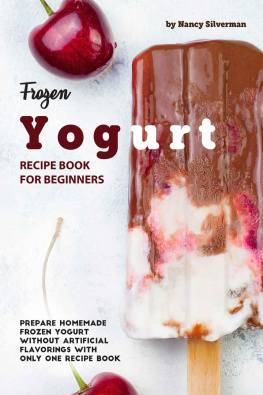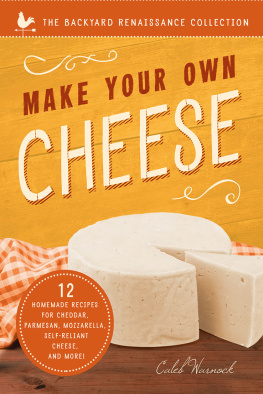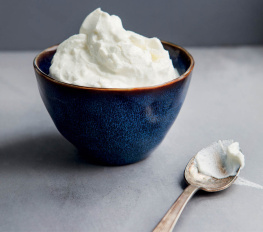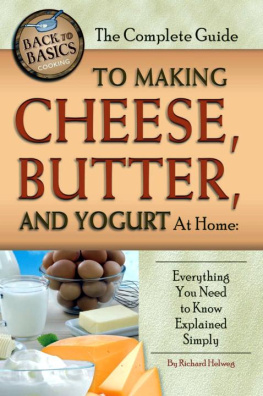Also by Carson Wyatt
Homesteading Freedom
Raising Beef Cattle for Beginner's Guide
Raising Ducks for Beginner's Guide
Raising Dairy Cattle for Beginners: A Simple Guide to Dairy Cattle for Milk & Eventually Meat
Beginners Guide to Making Homemade Cheese, Butter & Yogurt: Delicious Recipes Perfect for Every Beginner!
Tiny House: Beginner's Guide to Minimalist Living: Building Your Small Home Guide
A Relaxing Country Christmas Cookbook: Holiday Recipes you Should Have got From Your Grandmother!
Standalone
CBD Oil: the Ultimate Hemp Health Guide
Beginners Guide to Making Homemade Cheese, Butter & Yogurt
Delicious Recipes Perfect for Every Beginner!
Carson Wyatt
2017
Copyright 2017 by CiJiRO Publishing- All rights reserved.
This document is geared toward providing exact and reliable information in regard to the topic and issue covered. The publication is sold with the idea that the publisher is not required to render accounting, officially permitted, or otherwise, qualified services. If advice is necessary, legal or professional, a practiced individual in the profession should be ordered.
- From a Declaration of Principles which was accepted and approved equally by a Committee of the American Bar Association and a Committee of Publishers and Associations.
In no way is it legal to reproduce, duplicate, or transmit any part of this document in either electronic means or in printed format. Recording of this publication is strictly prohibited and any storage of this document is not allowed unless with written permission from the publisher. All rights reserved.
The information provided herein is stated to be truthful and consistent, in that any liability, in terms of inattention or otherwise, by any usage or abuse of any policies, processes, or directions contained within is the solitary and utter responsibility of the recipient reader. Under no circumstances will any legal responsibility or blame be held against the publisher for any reparation, damages, or monetary loss due to the information herein, either directly or indirectly.
Respective authors own all copyrights not held by the publisher.
The information herein is offered for informational purposes solely, and is universal as so. The presentation of the information is without contract or any type of guarantee assurance.
The trademarks that are used are without any consent, and the publication of the trademark is without permission or backing by the trademark owner. All trademarks and brands within this book are for clarifying purposes only and are the owned by the owners themselves, not affiliated with this document.
Table of Contents
T hink about how much you actually eat cheese. You may put it on your sandwiches, you may have it as a snack, or you may have it with dinner or in your omelette. The sheer fact of the matter is that many people enjoy cheese throughout the day, and if youre here you already realize that like many others you are a cheese lover. So why not learn to make your own cheese? Thats what this book can teach you. This book will teach you how to make your own cheeses, yogurt, and even butter.
This book will teach you everything you need to know to make various forms of each, helping you to fill your fridge with homemade goodies that you can enjoy day after day. Its a skill that youll be able to take with you for the rest of your life and even pass on to your children! Youll even learn fun combinations for yogurt and butter that will make cooking a little more fun and flavorful.
H ow to Start Making Cheese
Cheese making requires very few ingredients, so you will want to make sure that freshness and quality is in each and every ingredient. The quality of your ingredients will show through in your finished product. In this chapter youll learn about the crucial ingredients youll need to start making cheese. You cant make anything without these.
Y ou will need milk to start which is full of minerals, lactose (milk sugar), milk fat (butterfat), proteins, trace milk solids and even vitamins. There are many mammals that produce milk, and by definition it also includes plant and nut milks. Cows milk, goat milk, sheep and even water buffalo milk is commonly used in cheese making. You will want to use the freshest milk that you can, so try to get it from a small dairy thats local to you.
Focus on quality, so if you can visit the dairy before picking your milk out, it is recommended that you do. If the animals are happy and everything is clean and held to high standards it is a good indication that you will have fresh, quality milk. If you dont have a small dairy farm near you, try your farmers market or see if there is a local farm that will make a deal with you for their extra milk. Pasteurization is where they partially sterilize milk at, but you dont necessarily have to use pasteurized milk for cheeseparing.
Many people feel it is better to use raw milk but that is something that you will need to decide for yourself. If you see a commercial milk that is homogenized you need to realize that this is not the best milk for making cheese. During homogenization, the fats are emulsified into the other components. This will keep the cream from separating which will make it less efficient for cheese making. Cows milk is the most common and affordable, especially in the US. However, goats milk is usually readily available as well. If you have a local sheep dairy nearby you may want to consider this as an option as well.
T his is bacteria that you add to milk to produce cheese and yogurt as well. When you use a starter culture this is called ripening your cheese. You can buy both starter cultures and secondary cultures at most cheese shops but you can also find them online. Your quality of cheese will be determined by your starter culture. This will also define your type and safety of your cheese. There are different starter cultures to choose from, and youll find some below.

